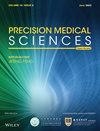The application of magnetic resonance ultrasmall magnetic Fe3O4 nano bimodal contrast agent in rabbit orthotopic liver tumors
IF 0.6
Q4 MEDICINE, RESEARCH & EXPERIMENTAL
引用次数: 0
Abstract
To investigate the diagnostic value of ultra‐small superparamagnetic Fe3O4 nanoparticles as dual modal contrast agent in rabbit orthotopic liver tumor. Twenty‐four New Zealand rabbits with orthotopic liver tumor were randomly divided into experimental group and control group. The experimental group contained 12 rabbits which intravenously injected with Fe3O4 nanoparticles and the control group contained 12 rabbits which intravenously injected with Gd‐DTPA. After injection, the cross‐sectional T1 and T2‐weighted scan images of experimental group and cross‐sectional T1‐weighted scan images of control group were obtained at the different timepoints (including 0, 5, 15, 20, 30, 45, 60, 75, 90, 120, 180, and 240 min) with a clinical 3.0 T MRI scanner. The SNR value of the tumor site and the normal liver site at different time points were calculated, respectively, and then the signal change value (CNR) of the tumor relative to the normal liver tissue was obtained. The r1 value of Fe3O4 nanoparticles was significantly higher than Gd‐DTPA (6.97 mM−1 s−1 for Fe3O4 nanoparticles and 4.75 mM−1 s−1 for Gd‐DTPA and only Fe3O4 nanoparticles exhibited the r2 relaxation rate which was 22.53 mM−1 s−1). In addition, the r2/r1 ratio of Fe3O4 was 3.23 which also demonstrated the strong MR relaxation characteristics of Fe3O4 nanoparticles. Compare with clinical used MRI contrast agent (Gd‐DTPA), the ultra‐small magnetic Fe3O4 nanoparticles not only showed the better T1 contrast enhancement but also exhibited the T1/T2 dual‐modal enhanced contrast ability, which could improve the accuracy and sensitivity of MRI diagnosis and realize the early diagnosis of diseases in prospect.磁共振超微磁性Fe3O4纳米双峰造影剂在兔原位肝肿瘤中的应用
探讨超微超顺磁性纳米Fe3O4作为双模态造影剂对兔原位肝肿瘤的诊断价值。将24只原位肝肿瘤新西兰兔随机分为实验组和对照组。实验组12只兔静脉注射Fe3O4纳米颗粒,对照组12只兔静脉注射Gd - DTPA。注射后,在临床3.0 T MRI扫描仪上获取实验组和对照组在不同时间点(0、5、15、20、30、45、60、75、90、120、180和240 min)的T1和T2加权横断面扫描图像。分别计算肿瘤部位和正常肝脏部位在不同时间点的SNR值,从而得到肿瘤相对于正常肝组织的信号变化值(CNR)。Fe3O4纳米粒子的r1值明显高于Gd‐DTPA (Fe3O4纳米粒子为6.97 mM−1 s−1,Gd‐DTPA为4.75 mM−1 s−1),只有Fe3O4纳米粒子表现出22.53 mM−1 s−1的r2弛豫速率。此外,Fe3O4的r2/r1比为3.23,也显示出Fe3O4纳米颗粒具有较强的MR弛豫特性。与临床使用的MRI造影剂(Gd - DTPA)相比,超微磁性Fe3O4纳米颗粒不仅具有较好的T1增强效果,而且具有T1/T2双峰增强造影剂能力,可提高MRI诊断的准确性和敏感性,有望实现疾病的早期诊断。
本文章由计算机程序翻译,如有差异,请以英文原文为准。
求助全文
约1分钟内获得全文
求助全文

 求助内容:
求助内容: 应助结果提醒方式:
应助结果提醒方式:


